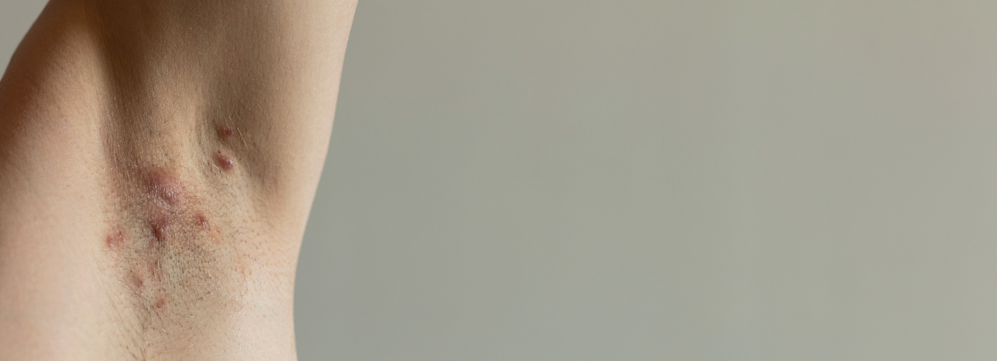
Hidradenitis Suppurativa (HS) is a chronic skin condition that causes painful lumps and boils to form in the folds of the skin, such as in the armpits, groin, buttocks, or breast area. These boils can often transform into hardened clusters that secrete pus and blood. As these areas begin to heal, scars can form, which often lead to patients developing tunnel-like tracks under their skin. These tracks can harden, which may make physical movement difficult.
HS tends to start during and immediately after puberty or early adulthood, and is often thought to be caused by obstructed hair follicles and secondary infection and inflammation of specific sweat glands.
According to the American Academy of Dermatology Association, HS is three times more common in women than men.
Symptoms
The signs and symptoms of HS include:
- Small, pitted areas of the skin that contain blackheads
- Painful pea-sized lumps or lesions
- Tunnels connecting lumps
Comorbidities
There are common health conditions found in patients with HS, including:
- Metabolic Syndrome
- Polycystic Ovarian Syndrome (PCOS)
- Dissecting Cellulitis
- Acne Conglobata
- Diabetes
- Inflammatory bowel diseases
- Nicotine use
- Spondyloarthrothopies
- Heart disease
- Higher Body Mass Index
Additionally, stress, hormonal changes, and heat or humidity may also worsen symptoms.
Hurley Staging
HS is classified into the following three stages:
- Hurley Stage I: A single boil without tunnels
- Hurley Stage II: More than one boil or more than one area affected, but with limited tunneling
- Hurley Stage III: Multiple boils with more extensive tunneling and scarring. This stage often involves an entire area of the body.
Treatment
Early detection of HS is key to getting effective treatment. Because this condition can look a lot like acne, it’s best to see a dermatologist early for a diagnosis.
The Dermatology Center of Indiana is currently recruiting patients for a clinical study on HS. Qualified applicants must:
- Have at least 5 lesions
- Have lesions in 2 different areas
- Have tried and failed an oral antibiotic treatment
- Have no prior use of Cosentyx, Taltz, or Siliq
If you’re interested in enrolling for this study, click here or call 317-837-6082.
Disclaimer: This blog provides general information and discussion about medical, cosmetic, mohs, and surgical dermatology. The words and other content provided in this blog, and in any linked materials, are not intended and should not be construed as medical advice. If the reader or any other person has a medical concern, he or she should consult with an appropriately licensed dermatologist or other healthcare worker.